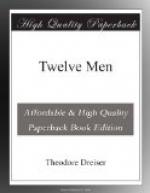I am sorry to write so, for after all youth must have its fling. Still, I had expected better of L——, and I was a little disappointed to see that earlier dream of simplicity and privation giving way to an absolutely worthless show. Besides, twenty or thirty such stories as “The Right Man,” “Sweet Dreams,” “The Man With the Broken Fingers,” “The Second Motive,” would outweigh a thousand of the things he was getting published and the profits of which permitted him these airs.
Again, during the early days of his success with M——, he had married—a young nurse who had previously been a clerk in a store, a serious, earnest and from one point of view helpful person, seeing that she could keep his domestic affairs in order and bear him children, which she did, but she had no understanding of, or flair for, the type of thing he was called upon to do. She had no instinct for literature or the arts, and aside from her domestic capacities little skill or taste for “socializing.” And, naturally, he was neglecting her. His head was probably surging with great ideas of art and hence a social supremacy which might well carry him anywhere. He had bought a farm some distance from New York, where in a community supposedly inhabited by successful and superior men of letters he posed as a farmer at times, mowing and cocking hay as became a Western plow-boy; and also, as the mood moved him, and as became a great and secluded writer, working in a den entirely surrounded by books in fine leather bindings (!) and being visited by those odd satellites of the scriptic art who see in genius of this type the summum bonum of life. It was the thing to do at that time, for a writer to own a farm and work it. Horace had. One individual in particular, a man of genuine literary and critical ability and great taste in the matter of all the arts but with no least interest in or tolerance for the simplicities of effort, came here occasionally, as I heard, to help him pile hay, and this in a silk shirt and a monocle; a second—and a most fascinating intellectual flaneur, who, however, had no vision or the gift of dreams—came to eat, drink, talk of many things to be done, to steal a few ideas, borrow a little money perhaps or consume a little morphine, and depart; a third came to spout of his success in connection with plays, or his proposed successes; a fourth to paint a picture, urged on by L——; a fifth to compose rural verse; a sixth, a broker or race-track tout or city bar-tender (for color, this last), to marvel that one of L——’s sense, or any one indeed, should live in the country at all. There were drinking bouts, absolute drunkenness, in which, according to the Johnsonian tradition and that of Messieurs Rabelais and Moliere, the weary intellect and one’s guiding genius were immersed in a comforting Lethe of rye.




